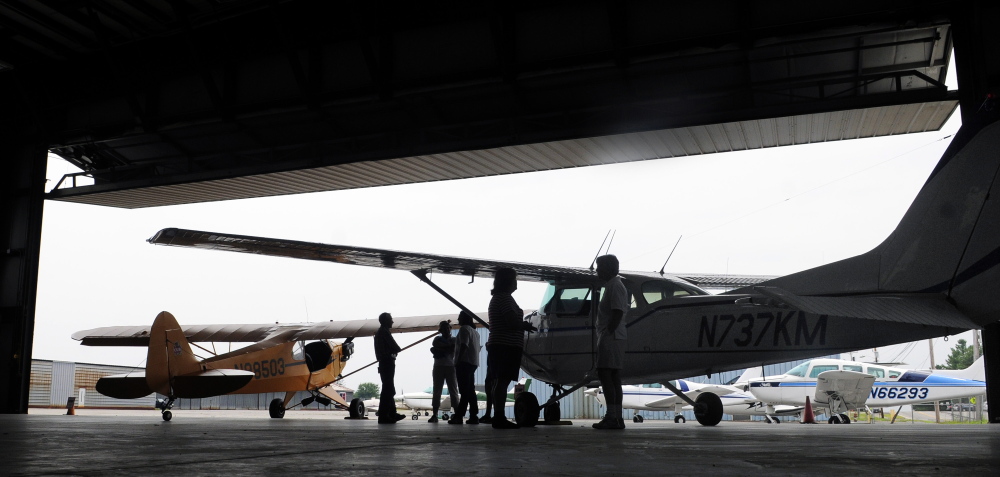AUGUSTA — City councilors have approved a tax increment financing tax break to help Maine Instrument Flight build a new hangar at Augusta State Airport.
The proposal unanimously approved by councilors Thursday would return 50 percent of the taxes on the new development, projected to be about $4,800 a year, to Maine Instrument Flight for the next 18 years.
Councilors said the deal won’t cost the city any revenue and will bring economic development to the city by helping bring more airplane traffic to the city and boost a new partnership between Maine Instrument Flight and the University of Maine at Augusta offering degrees in aviation.
“The building itself is not as substantial as the mall complex, but a small amount of money with a smaller business can make a big difference,” At-Large Councilor Jeffrey Bilodeau said. “And we don’t lose any money in this deal. It’s a win for the city and the business developer and the community. Thank you to Maine Instrument Flight for investing in the community.”
Bill Perry, owner of Maine Instrument Flight, said the business has needed more storage space for planes for years, but it hasn’t been able to add a new hangar until now. He said Maine Instrument Flight has been losing business to other airports because plane owners and operators want to keep their multimillion-dollar planes under cover, but the company doesn’t have enough indoor storage space to accommodate them.
The proposed 95-foot-square hangar would be built alongside Winthrop Street on the grounds of the city-run, state-owned airport, where Maine Instrument Flight holds a lease for the next 18 years. An old, smaller storage building there would be demolished to make way for the new hangar, which would be in addition to an existing hangar attached to Maine Instrument Flight’s offices and other existing hangars.
Perry said they initially planned a 120-foot-by-100-foot hangar but scaled back their plans because of space constraints and the cost of the larger building.
He said the smaller hangar will cost about $650,000 to build.
TIFs allow municipalities to shelter property taxes generated by new development within designated districts. Sheltering money through a TIF means it would not be added to the city’s total property valuation for state tax calculation purposes. Without that, as a municipality’s total property valuation increases, its state-provided revenue — such as aid for education and revenue sharing — decreases, and its county tax liability increases. New value sheltered in a TIF doesn’t count toward a municipality’s property tax value.
Mayor David Rollins said the TIF proposal for Maine Instrument Flight is roughly revenue-neutral for the city, because it would avoid the tax shift that would occur if the same development proceeded without being sheltered in a TIF and the city’s property valuation increased.
A municipality can return all, none, or some of the tax payments to the business or use the money itself for projects allowed to be funded under state TIF rules.
In this proposal, Maine Instrument Flight would retain half the taxes it otherwise would owe on the building, about $4,800 a year. The city would get the other half, which would be put into the city’s already established Downtown TIF fund to be used for allowed projects in the Downtown TIF District.
“We’ve sheltered that so we can capture that and reimburse that amount of money that’d otherwise go into the state stratosphere,” Rollins said. “As far as an Augusta taxpayer is concerned, the amount we get is the same whether we TIF it or not. And with a TIF the money stays in Augusta.”
Maine Instrument Flight’s recent expansion included the addition of a partnership to train pilots with UMA. Perry said the hangar isn’t being built specifically for that program, as the business primarily needs more space for its general operations.
The new hangar would be built by Augusta-based Peachey Builders. City officials estimate it would be worth about $516,000 for tax purposes.
Keith Luke, the city’s deputy development director, said the TIF is proposed for 18 years to match the remaining time on the aviation business’s lease at the airport.
Keith Edwards — 621-5647
kedwards@centralmaine.com
Twitter: @kedwardskj
Copy the Story LinkSend questions/comments to the editors.




Success. Please wait for the page to reload. If the page does not reload within 5 seconds, please refresh the page.
Enter your email and password to access comments.
Hi, to comment on stories you must . This profile is in addition to your subscription and website login.
Already have a commenting profile? .
Invalid username/password.
Please check your email to confirm and complete your registration.
Only subscribers are eligible to post comments. Please subscribe or login first for digital access. Here’s why.
Use the form below to reset your password. When you've submitted your account email, we will send an email with a reset code.